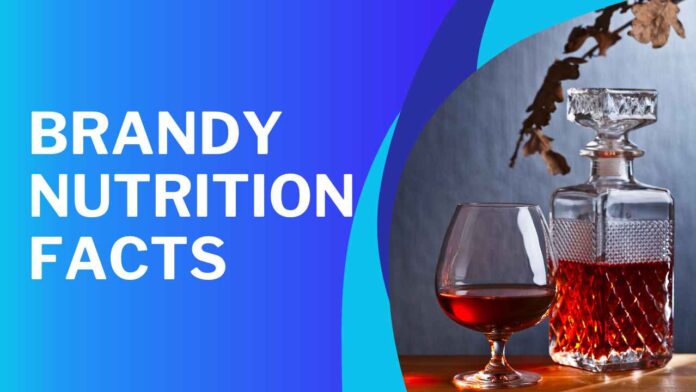This page may contain affiliate links. Please see our Disclaimer for more information. Always drink responsibly and adhere to your local legal drinking age.
Introduction
Brandy is a popular distilled spirit many enjoy for its rich flavor and smooth texture. But aside from being a go-to drink for special occasions and gatherings, have you ever wondered about the nutritional content of this classic beverage? This blog post will dive deep into brandy nutrition facts, exploring its calorie and carbohydrate count and potential health effects.
From benefits like improved heart health to risks such as alcohol addiction, we’ll help you make informed decisions when reaching for that next glass.
Key Takeaways:
- A 1.5-ounce (42g) serving of brandy contains approximately 97 calories but has no carbs, fats or proteins.
- Brandy, in moderation, may have potential health benefits such as improved heart health, reduced stress and anxiety levels, aiding in digestion and anti-inflammatory properties.
- Excessive brandy consumption can lead to alcohol addiction and increase the risk of liver damage. Always drink responsibly and monitor intake closely.
- When choosing a cocktail with low calories and sugar content, consider straight brandy or mixing it with club soda for a refreshing option without unwanted carbs.
What Is Brandy, And How Is It Made?
Brandy is a refined, complex, and flavorsome spirit that cocktail drinkers have enjoyed for centuries. Originating from the Dutch term ‘brandewijn,’ which translates to burnt wine, brandy is essentially distilled wine made primarily from grapes.
The production process of brandy starts with fermenting crushed fruit – typically grapes – to create a liquid known as must. This fruity juice is then fermented into an alcoholic beverage called wine, which serves as the base for distillation.
During this distillation stage, the wine is heated in copper stills until its alcohol content evaporates and condenses into a higher-proof spirit.
Various types of brandy are available on the market today, each offering unique characteristics based on factors like region of origin and length of aging.
For example, Cognac hails from France’s famed Cognac region and adheres to strict production guidelines that contribute to its distinct taste profile; meanwhile, Armagnac exhibits robust flavors due to more extended barrel-aging periods than most other varieties.
Brandy Nutrition Facts
Brandy is a distilled spirit with 97 calories per 1.5 ounces but no carbs, fats, or proteins.
Calories
Brandy, a popular choice amongst cocktail drinkers, is typically enjoyed in modest quantities due to its rich flavor. Understanding the caloric content of this well-loved spirit is essential for those mindful of their daily calorie intake.
A standard 1 fluid ounce (28g) serving size of Brandy contains approximately 65 calories, derived purely from alcohol as it has 0% fat, carbs, and protein.
Interestingly, by increasing the serving size to a jigger (1.5 fl oz), Brandy’s calorie count goes up to around 104 calories while still maintaining negligible amounts of fat, protein, and carbohydrates.
Comparatively speaking, most distilled spirits contain roughly similar calorie counts – about 96-98 calories per 1.5-ounce serving with no carbohydrates.
Carbohydrates
Brandy, a popular choice for many cocktail enthusiasts, contains zero carbohydrates per serving. This distilled spirit is made by fermenting fruits such as grapes and aging the resulting mixture in oak barrels to develop its unique flavor profile.
On the other hand, it’s essential to remember that cocktails with added mixers may introduce carbs into your drink. For example, combining brandy with fruit juice or sugary syrups will significantly increase the carbohydrate content.
If you’re aiming for a low-carb option while indulging in a delicious libation, consider sticking to straight brandy or mixing it with club soda and a twist of lemon or lime peel – negating any unwanted carbs while still enjoying a refreshing cocktail experience.
Protein
While brandy may not be a significant source of protein, it’s still an essential nutrient your body needs. Protein helps build and repair tissues in our bodies, making it crucial for maintaining muscle mass and supporting healthy bones.
While you won’t find any protein in brandy, you can always pair your drink with a high-protein snack to round out your diet.
It’s worth noting that if you’re looking for a low-calorie option to enjoy on its own or mixed into cocktails, brandy is a great choice. With zero carbs and fat per serving, it offers the same great taste as other spirits without the added calories.
Fat
While it’s essential to keep an eye on fat intake, the good news is that brandy has 0% fat. That means you can sit back and enjoy a glass or two without worrying about adding extra fat to your daily diet.
In fact, consuming moderate amounts of brandy can even help with weight loss efforts compared to high-fat foods since fats contain nine calories per gram compared to seven calories per gram in alcohol.
So, if you’re looking for a low-fat alcoholic beverage option that won’t ruin your diet plan, reaching for a shot of brandy might be just what you need.
Vitamins And Minerals
Brandy is not just a spirit meant for sipping but contains various essential vitamins and minerals. A 1.5-ounce serving of brandy provides an array of nutrients such as Vitamin B6, which helps in brain development and the formation of red blood cells; Vitamin E, which acts as an antioxidant to protect our body from free radicals; Calcium and Phosphorus, vital for maintaining healthy bones and teeth; Potassium promotes heart health by regulating blood pressure levels while Zinc boosts our immune system.
Selenium in brandy is classified as a trace mineral but plays a crucial role in DNA synthesis and preventing oxidative damage.
Health Benefits Of Consuming Brandy In Moderation
Moderate brandy consumption has been associated with improved heart health, reduced stress and anxiety, digestive aid, and anti-inflammatory properties.
Improved Heart Health
Regular and moderate brandy consumption has been linked to numerous health benefits, including improved heart health. Brandy’s antioxidant properties help reduce inflammation in the blood vessels, which can decrease the risk of cardiovascular diseases such as heart attacks or strokes.
In addition, it also helps regulate cholesterol levels by increasing the good HDL cholesterol while reducing the bad LDL cholesterol. However, it is important to note that excessive drinking can adversely affect heart health and other aspects of our overall well-being.
Reduced Stress And Anxiety
A small glass of brandy might do the trick if you’re looking for a way to unwind after a long day. Studies have shown that moderate alcohol consumption can decrease stress and anxiety, helping you relax.
And when consumed in moderation, brandy has been known to provide some relaxation benefits without causing negative side effects. However, it’s important to remember that excessive drinking can increase feelings of anxiety and depression, so always drink responsibly.
Digestive Aid
Brandy has been used for centuries as a digestive aid because it stimulates the cardiac muscle. Its warm and soothing properties help relax the muscles in your stomach, relieving cramps and easing digestion.
Additionally, brandy’s high alcohol content stimulates the secretion of digestive enzymes, helping you break down food more effectively.
However, it’s important to note that overconsumption of brandy can adversely affect your digestive system and overall health. Moderation is key when enjoying this beverage, as too much alcohol can irritate the lining of your stomach, leading to inflammation or gastritis.
Anti-inflammatory Properties
Brandy, like other alcoholic beverages, is often associated with relaxation and a good time. However, it has anti-inflammatory properties that can help relieve respiratory issues such as sore throats.
Consuming brandy in moderation can have health benefits due to these properties. It’s important to note that excessive drinking of any alcoholic beverage can cause inflammation and damage to the body’s organs.
Potential Risks Of Consuming Brandy
Excessive brandy consumption can result in negative health effects, including alcohol addiction and an increased risk of liver damage.
Alcohol Addiction
Consuming excessive amounts of alcohol, including brandy, can lead to addiction. It’s important to remember that drinking beyond moderation can have severe negative consequences on your health and well-being.
Alcohol addiction can affect all areas of life, from relationships and work to personal finances. Heavy drinkers are also at a higher risk for liver damage, heart problems, and other serious health issues.
Be sure to monitor your alcohol consumption closely, especially if it’s becoming difficult to control your intake or interfere with daily responsibilities.
Negative Effects On Liver Health
Consuming brandy in excess can hinder the liver’s ability to function correctly. The liver is responsible for filtering toxins, and excessive alcohol consumption can build up harmful byproducts, which may cause inflammation or damage to the organ.
It’s important to note that moderate consumption of brandy is not likely to cause significant harm unless consumed over a prolonged period. However, suppose you have pre-existing medical conditions such as hepatitis or are taking medication that affects your liver function. In that case, you should consult your doctor before indulging in alcoholic beverages.
In conclusion, as much as we love our cocktails and sips of brandy occasionally, it’s essential to remember that excessive alcohol consumption has negative effects on general health but especially on the normal functioning of the heart and kidneys and, most importantly, the smooth functioning of the liver.
How To Choose A Healthier Brandy
To choose a healthier brandy, choose organic and natural options with lower alcohol and sugar content.
Organic And Natural Options
If you’re looking for a healthier brandy option, consider these organic and natural options:
- Look for brandy made from organic grapes to ensure no synthetic pesticides or fertilizers were used in the grape-growing process.
- Opt for brandy that has not been artificially flavored or colored with chemical additives.
- Choose brandy aged in oak barrels instead of those treated with artificial flavorings or chemicals. The oak adds natural flavor and color to the brandy.
- Search for artisanal brands produced by small distillers who prioritize using natural ingredients and techniques to create their products.
Lower Alcohol Content
Choosing a healthier brandy can be as simple as looking for options with lower alcohol content. While the standard proof for brandy is 80, some brands have a lower proof.
An example of this is applejack brandy, which has a proof of 50 and contains fewer calories compared to higher-proof types. Lower alcohol content means less pure alcohol in your drink, leading to fewer calories consumed.
Other factors like sugar levels and overall quality should not be overlooked when choosing a healthier brandy option. Organic and natural options may contain fewer additives while delivering robust flavors and aromas.
Lower Sugar Content
If you want to limit your sugar intake, you’ll be pleased to know that brandy is an excellent choice. Unlike other alcohols, brandy doesn’t contain any carbs or sugars, making it a healthier option for those watching their sugar intake.
Of course, it’s worth remembering that even though brandy doesn’t have any added sugars, mixing it with sugary mixers can quickly hike up the sugar content of your cocktail.
Brandy Cocktails And Their Nutritional Value
Discover the nutritional value of classic brandy cocktails and learn how to make healthier, low-calorie options.
Classic Cocktails
Classic cocktails associated with brandy have stood the test of time and remain popular today. Here are some classic brandy cocktails and their nutritional value:
- Brandy Alexander – This creamy cocktail contains 238 calories, 11 grams of fat, and 11 grams of carbohydrates.
- Sidecar – Made with Cointreau, lemon juice, and brandy, this cocktail has roughly 200 calories per serving.
- Vieux Carré – A New Orleans classic made with rye whiskey, cognac, sweet vermouth, and bitters has around 267 calories.
- French Connection – Made with equal parts cognac and amaretto liqueur, this simple yet delicious cocktail contains about 170 calories.
- Sazerac – Another New Orleans favorite made with rye whiskey or cognac, sugar cube, and Peychaud’s bitters, has approximately 130-150 calories per serving.
As with all cocktails, be mindful of your consumption, as they can quickly add up in calories and alcohol content.
Low-Calorie Options
If you’re watching your calorie intake, plenty of low-calorie cocktail options include brandy without the added sugars and carbs. Check out some of these tasty ideas:
- Brandy and Diet Soda: A shot of brandy mixed with diet soda is a low-cal option that won’t break your calorie bank.
- Brandy and Seltzer: Swap out the diet soda for seltzer water to add some carbonation without adding calories.
- Brandy Sour: Mix brandy, lemon juice, and a sugar-free sweetener for a refreshing sour drink light on calories.
- Skinny White Russian: Add some brandy to unsweetened almond milk and coffee liqueur for a lower-calorie take on the classic White Russian.
- Brandy Old Fashioned: Opt for using a sugar-free sweetener instead of traditional simple syrup and top it off with soda water for an almost guilt-free version of this classic cocktail.
Remember that while these drinks may be lower in calories, they still contain alcohol which can have negative effects on your health if consumed in excess. Enjoy responsibly, and always drink in moderation!
Brandy Vs Other Alcoholic Beverages
Brandy tends to have a higher alcohol content and calorie count compared to wine and beer. Still, it also offers potential health benefits such as improving heart health and digestion when consumed in moderation.
Comparing Calories And Carbs
When comparing the calories and carbs in brandy to other alcoholic beverages, it’s essential to consider the nutritional content of each drink. The table below illustrates the differences between various popular cocktails and brandy regarding calories and carbohydrates.
| Alcoholic Beverage | Calories (per 1.5 oz serving) | Carbohydrates (grams) |
|---|---|---|
| Brandy | 97 | 0 |
| Vodka | 96 | 0 |
| Gin | 96 | 0 |
| Whiskey | 97 | 0.1 |
| Tequila | 96 | 0 |
| Rum | 97 | 0 |
| Beer (12 oz) | 153 | 12.6 |
| Red Wine (5 oz) | 125 | 3.8 |
| White Wine (5 oz) | 121 | 3.8 |
| Champagne (5 oz) | 96 | 2.5 |
| Margarita (4 oz) | 168 | 10 |
| Martini (3.5 oz) | 199 | 0.5 |
As demonstrated, brandy and other distilled spirits have a lower calorie and carb count than beer, wine, and mixed cocktails. However, it’s crucial to remember that alcoholic beverages, in general, contribute to weight gain and offer minimal nutritional value. Be mindful of your alcohol consumption to maintain a healthy lifestyle.
Comparing Health Benefits
Regarding health benefits, brandy has some advantages over other alcoholic beverages. In the table below, we’ll look at how brandy compares to other popular alcoholic drinks such as red wine, gin, vodka, whiskey, and beer regarding health benefits.
| Alcoholic Beverage | Health Benefits |
|---|---|
| Brandy | Improved heart health, reduced stress and anxiety, digestive aid, and anti-inflammatory properties. |
| Red Wine | It contains antioxidants, promotes heart health, and may reduce the risk of certain cancers. |
| Gin | Low in calories and carbohydrates, has potential antioxidant properties, and may help digestion. |
| Vodka | Low in calories and carbohydrates, provides stress relief, and may help with digestion. |
| Whiskey | It contains antioxidants, may promote heart health, and possibly reduce the risk of dementia. |
| Beer | It contains vitamins, minerals, and antioxidants but has higher calorie and carbohydrate content than the other beverages on this list. |
It’s important to note that these health benefits are associated with moderate consumption of alcohol. Excessive drinking can lead to several health risks, including addiction, liver damage, and weight gain. Always enjoy your brandy and other alcoholic beverages responsibly.
Frequently Asked Questions
What are some common questions people have about brandy nutrition? Does it contain gluten? Is it safe for people with diabetes? Can it affect weight loss efforts? Keep reading to find answers and learn more about how brandy fits into your healthy lifestyle.
Does Brandy Contain Gluten?
If you suffer from gluten intolerance, it’s important to know whether your favorite alcoholic beverages contain gluten. Pure, distilled brandy is considered gluten-free because the distillation process separates any wheat or barley ingredients that may have been used in the initial fermentation.
However, additives such as flavorings and colorings should be checked for potential gluten content. It’s always a good idea to confirm with the specific brand of brandy you’re consuming to ensure that there are no hidden sources of gluten.
Is Brandy Safe To Drink For People With Diabetes?
Brandy can be a safe alcoholic drink for people with diabetes to enjoy in moderation. Unlike other alcoholic beverages, brandy does not contain any carbohydrates, which can cause blood sugar levels to spike and lead to complications for individuals with diabetes.
However, it is important to remember that alcohol intake can significantly increase the risk of hypoglycemia (low blood sugar). People with diabetes need to be extra careful when consuming alcohol and monitor their blood sugar levels closely.
Can Brandy Affect Weight Loss Efforts?
Choosing the right drink can be just as important as selecting the right foods for those looking to lose weight. Thanks to its low-calorie content, Brandy is often a go-to choice for those watching their calorie intake.
A 1.5-ounce serving of brandy contains only 97 calories and has no carbohydrates or fat. However, it’s worth noting that alcohol can slow down weight loss efforts by affecting organ function and providing “empty calories” with little nutritional value.
Drinking too much brandy (or any alcohol) can also lead to hunger pangs and overeating, further setting back your progress toward your weight loss goals.
FAQ
Q: What is brandy?
A: Brandy is a type of liquor made by distilling wine. It is typically made from grapes but can also be made from other fruits such as apples or cherries.
Q: What are the nutrition facts for brandy?
A: A 1-ounce serving of brandy contains about 64 calories, 0 grams of protein, 0 grams of fat, and 0 grams of fiber. It also has about 0.2 grams of net carbs.
Q: What is the daily value for brandy?
A: There is no daily value for brandy since it is not considered a nutrient.
Q: Where can I find brandy nutrition information?
A: You can find brandy nutrition information on the bottle’s label or on a nutrition analysis website such as the USDA Food Composition Databases.
Q: How many calories are in a gram of brandy?
A: There are 7 calories in a gram of brandy. This is opposed to 4 calories per gram for protein and carbohydrates, and 9 calories per gram for fat.
Q: What is a serving of brandy?
A: A standard serving of brandy is 1.5 ounces (or 42 grams) which contains about 96 calories and 0.3 grams of net carbs.
Q: What is 80-proof brandy?
A: 80-proof brandy is a type of brandy that contains 40% alcohol by volume.
Q: What does the full nutrition label for brandy tell me?
A: The full nutrition label for brandy will tell you how much of each nutrient is in a serving of brandy, including calories, carbs, fat, protein, and alcohol.
Q: How do I use brandy nutrition information to personalize my diet and exercise plan?
A: By taking into account the calories and net carbs in a serving of brandy, you can adjust your diet and exercise plan to accommodate your intake of alcohol.
Q: Is brandy a recommended part of a healthy diet?
A: While moderate alcohol consumption has been linked to some health benefits, consuming brandy specifically for health reasons is not recommended. It is important to consume alcohol in moderation and to always discuss any changes to your diet or exercise plan with a healthcare professional.
Conclusion: The Role Of Brandy In A Healthy Lifestyle
In conclusion, while brandy may not be a significant source of vitamins and minerals, it can still have potential health benefits when consumed in moderation.
With its low carb and sugar content, brandy can be a better choice than other alcoholic beverages for those watching their calorie intake. However, it’s essential to consider the potential risks of excessive consumption and choose healthier options like organic and lower alcohol content brands.





















